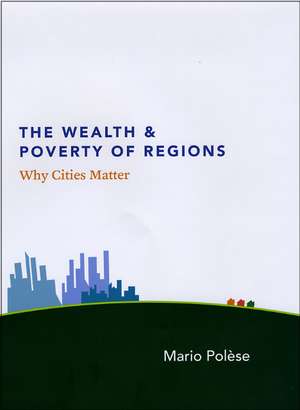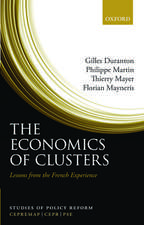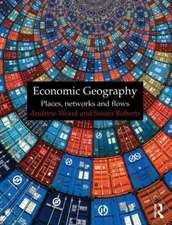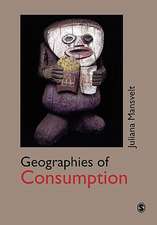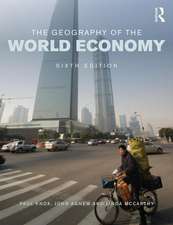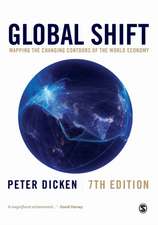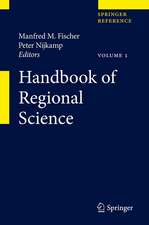The Wealth and Poverty of Regions: Why Cities Matter
Autor Mario Polèseen Limba Engleză Hardback – feb 2010
As the world becomes more interconnected through travel and electronic communication, many believe that physical places will become less important. But as Mario Polèse argues in The Wealth and Poverty of Regions, geography will matter more than ever before in a world where distance is allegedly dead.
This provocative book surveys the globe, from London and Cape Town to New York and Beijing, contending that regions rise—or fall—due to their location, not only within nations but also on the world map. Polèse reveals how concentrations of industries and populations in specific locales often result in minor advantages that accumulate over time, resulting in reduced prices, improved transportation networks, increased diversity, and not least of all, “buzz”—the excitement and vitality that attracts ambitious people. The Wealth and Poverty of Regions maps out how a heady mix of size, infrastructure, proximity, and cost will determine which urban centers become the thriving metropolises of the future, and which become the deserted cities of the past. Engagingly written, the book provides insight to the past, present, and future of regions.
This provocative book surveys the globe, from London and Cape Town to New York and Beijing, contending that regions rise—or fall—due to their location, not only within nations but also on the world map. Polèse reveals how concentrations of industries and populations in specific locales often result in minor advantages that accumulate over time, resulting in reduced prices, improved transportation networks, increased diversity, and not least of all, “buzz”—the excitement and vitality that attracts ambitious people. The Wealth and Poverty of Regions maps out how a heady mix of size, infrastructure, proximity, and cost will determine which urban centers become the thriving metropolises of the future, and which become the deserted cities of the past. Engagingly written, the book provides insight to the past, present, and future of regions.
Preț: 440.62 lei
Nou
Puncte Express: 661
Preț estimativ în valută:
84.34€ • 91.64$ • 70.89£
84.34€ • 91.64$ • 70.89£
Carte tipărită la comandă
Livrare economică 21 aprilie-05 mai
Preluare comenzi: 021 569.72.76
Specificații
ISBN-13: 9780226673158
ISBN-10: 0226673154
Pagini: 288
Ilustrații: 2 halftones, 23 line drawings, 3 tables
Dimensiuni: 152 x 229 x 23 mm
Greutate: 0.52 kg
Editura: University of Chicago Press
Colecția University of Chicago Press
ISBN-10: 0226673154
Pagini: 288
Ilustrații: 2 halftones, 23 line drawings, 3 tables
Dimensiuni: 152 x 229 x 23 mm
Greutate: 0.52 kg
Editura: University of Chicago Press
Colecția University of Chicago Press
Notă biografică
Mario Polèse holds the Senior Canada Research Chair in Urban and Regional Studies and is professor at the Institut national de la recherche scientifique (INRS) in Montreal. He is coauthor of, most recently, Connecting Cities with Macroeconomic Concerns.
Cuprins
List of Illustrations
Acknowledgments
Preface
1 Why Do Some Places Generate More Wealth Than Others?
Places in a Shrinking World
History and Industrial Legacies
2 Size and Location
The Four Golden Rules of Regional Growth
The Positive Relationship between Size and Wealth
The Seven Pillars of Agglomeration
Why Smaller Cities Exist
Location
A Simple Template
3 The Regional Origins of Wealth: Where It All Began
When Location and Size Mattered Less
Water and Waterways
A Tale of Two Continents
Europe’s Blue Banana
North America’s Bipolar Destiny
South of the Border—Mexico
Lessons from Europe and North America
4 Why Is the Geography of Wealth More Unequal in Some Nations?
On the Use of the Word “Disparity”
Why Regional Disparities Happen—and Should Eventually Disappear
Why Regional Disparities Are Higher in Some Nations
Why Are Regional Disparities More Difficult to Overcome in Some Nations?
Why the United States Is Different
5 Cities and National Economic Growth: An Asymmetrical Relationship
A Short History (and Explanation) of Urbanization
Urbanization Is an Outcome of Economic Growth (Not the Other Way Around)
Is Urbanization Different in Developing Nations?
Third World Cities: Victims of Progress?
The Difference between the Foundations of National and Local Economic Growth
6 Regional Growth in the Green and Gray Knowledge Economy
Hedonic Regional Growth
Green Migrations: Sun, Surf, and Cafés
Gray Migration: Golf, Châteaux, and Boardwalks
Size and Location Also Matter for Tourism
Revisiting the Rules of Regional Growth
Archipelagos of Growth
Zero-sum Growth
Some Places Will Decline
Some Places Will Continue to Grow (or Decline) for Unique Reasons
7 What Have We Learned?
Some Places Will Always Be Wealthier than Others
Cities Will Continue to Grow
The Diversification of the Sources of Regional Growth
The Never-ending Search for the Right Strategy
The New Importance of Place: People
Data Sources: Tables, Figures, and Maps
Notes
Bibliography
Index
Acknowledgments
Preface
1 Why Do Some Places Generate More Wealth Than Others?
Places in a Shrinking World
History and Industrial Legacies
2 Size and Location
The Four Golden Rules of Regional Growth
The Positive Relationship between Size and Wealth
The Seven Pillars of Agglomeration
Why Smaller Cities Exist
Location
A Simple Template
3 The Regional Origins of Wealth: Where It All Began
When Location and Size Mattered Less
Water and Waterways
A Tale of Two Continents
Europe’s Blue Banana
North America’s Bipolar Destiny
South of the Border—Mexico
Lessons from Europe and North America
4 Why Is the Geography of Wealth More Unequal in Some Nations?
On the Use of the Word “Disparity”
Why Regional Disparities Happen—and Should Eventually Disappear
Why Regional Disparities Are Higher in Some Nations
Why Are Regional Disparities More Difficult to Overcome in Some Nations?
Why the United States Is Different
5 Cities and National Economic Growth: An Asymmetrical Relationship
A Short History (and Explanation) of Urbanization
Urbanization Is an Outcome of Economic Growth (Not the Other Way Around)
Is Urbanization Different in Developing Nations?
Third World Cities: Victims of Progress?
The Difference between the Foundations of National and Local Economic Growth
6 Regional Growth in the Green and Gray Knowledge Economy
Hedonic Regional Growth
Green Migrations: Sun, Surf, and Cafés
Gray Migration: Golf, Châteaux, and Boardwalks
Size and Location Also Matter for Tourism
Revisiting the Rules of Regional Growth
Archipelagos of Growth
Zero-sum Growth
Some Places Will Decline
Some Places Will Continue to Grow (or Decline) for Unique Reasons
7 What Have We Learned?
Some Places Will Always Be Wealthier than Others
Cities Will Continue to Grow
The Diversification of the Sources of Regional Growth
The Never-ending Search for the Right Strategy
The New Importance of Place: People
Data Sources: Tables, Figures, and Maps
Notes
Bibliography
Index
Recenzii
“This is one of the most original books in the subject area that I have read in years—the nearest is Jane Jacobs, forty years ago. It is remarkable in the way it combines depth and breadth, all presented in a jargon-free, almost conversational style.”
“For the first time in history, more than half the human population now lives in urban areas. Although economists and other social scientists have paid a considerable attention to the unequal development of nations, much less is known regarding the magnitude of spatial inequalities within countries as well as to the role and strength of urban agglomeration economies in driving regional economic development. In the wake of new economic geography and modern urban economics, Mario Polèse has succeeded in providing a masterful synthesis of the various roles played by cities in the process of regional growth. Thanks to a magnificent and reader-friendly exposition, the material presented in this book is made available to a broad audience of scientists and decision makers.”
“Writing with flair and insight, Polèse blends economics, geography, and history to explain why some places grow and others do not. In this highly readable account, Polèse unwraps the patterns and processes, and the commonalities and nuances, of both rich and poor places to outline which cities will prosper in the twenty-first century. Drawing on examples from several continents, he tells a story in which many forces change while others continue to be influential.”
"This clearly argued and amply illustrated work is a useful introduction to the forces causing some cities/regions to grow and others to stagnate."
"Polèse's work is a tour de force for the rebirth of geography, both as a popular topic and as a discipline for deciphering the vast changes in our world. One can only hope that this book is but a preface to a subsequent exploration of this new transnational urban-industrial geography, for which we have few effective categories or concise words. Polèse has proven that he would be the right expert to take us on that journey."
“Interested in the question of why some places prosper and others lag behind? Then you need to read Mario Polèse’s wide-ranging book, The Wealth and Poverty of Regions. Polèse provides a way to consider how geography and location matter even as communication makes the globe seem smaller.”
